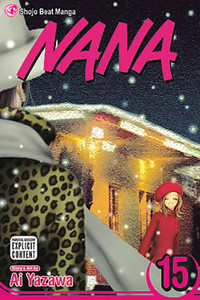Review
by Casey Brienza,NANA
GN 15
| Synopsis: |  |
||
The gossip tabloid Search has taken photographs of Ren and Reira in what appears to be an intimate, romantic moment. Desperate to stop the presses, Takumi averts catastrophe for Blast and Trapnest by cutting a deal with the editors. His relationship with Nana Komatsu public, which up until now has been a secret, goes public—and suddenly an official wedding between him and Hachi is again on the agenda. Unfortunately, marital bliss does not bless the life of Nana Osaki, who has seen the damning photographs. Are she and Ren going to call it quits? Also, the fallout with Search has Reira, who has staked everything on her singing career, thinking twice about her illicit relationship with Shin. Is his destined to be the next broken heart? |
|||
| Review: | |||
No one in NANA is traditionally religious. No Buddhist, Shinto, or even Christian rituals for these young people. Even Hachi's wedding to Takumi happens in the unromantic, after-hours environs of a Tokyo government office. However, they do indulge in one particular ill-formed superstition that started with Hachi way back in volume one and has proven—due to its effectiveness as comic relief—remarkably contagious: their troubles are the fault of the Demon Lord. So who exactly is this “Demon Lord”? No one, not even Hachi, seems to know, really. But one cannot help but wonder if the Demon Lord might not be veteran shoujo mangaka Ai Yazawa herself, the source of all the cruel and unexpected machinations of these characters' fates. Of course, the first page of volume fifteen proposes a hilarious alternative: Demon Lord is a brand of shochu (alcoholic beverage similar to vodka) that Nana finds in Kyushu and sends back to Hachi as a souvenir. This is undoubtedly the best first page in the series thus far; it does not descend in the usual pseudo-poetic bathos. Unfortunately, though humor is definitely one of the creator's strong points, most of the rest of volume fifteen is not especially funny…unless you think seeing Takumi pull one over on the editors of the tabloid rag Search is amusing. Otherwise, there is much as that is sad here—Shin's despair over being dumped by Reira, for example, and Nana's one miserably restrained encounter with Hachi, her pain hidden behind dark sunglasses. There is also the barest touch of the sinister; why did BLAST uber-fan Mai Tsuzuki use the name Misato Uehara, the name of the teenage girl that readers now know is Nana's biological sister? The book ends with a flash-forward that answers one heretofore unrevealed question about the nature of Hachi's future. As always, the tightly-woven plot is strong, but the character development is simply stellar. The nature of the relationship between Nana and Hachi is an audacious one by mainstream shoujo manga standards, with Nana confused about how to relate to Hachi, the woman she loves most in the world. Previously, she was told that she had to be the hero and that she could not depend upon Hachi. But being the prince presses down with the weight of tragedy upon her. Like Utena in Shoujo Kakumei Utena, she wants to depend upon as well as to be depended upon. For now, at least, she has to rely upon a man when she needs to be weak, and this offense her feminist senses. In any case, whether or not she will ever be able to square the circle in her dealings with Hachi remains the question of the series. Again as always, the artwork is exquisite as well. Yazawa has improved her draftsmanship dramatically in the two decades she has been publishing, and her “mature stage,” which became firmly established in Gokinjo Monogatari, is characterized by glamorous layouts and a razor-edged fashion sense. Expression ranges from silly to sensuous to sentimental, and she executes all of it with equal, pitch-perfect skill. If the Viz Media edition of this manga has a weakness, it is the sheer campiness of its English adaptation. The youth slang comes fast and furious, but it is some weird fantasy of the way hip young people talk, not a faithful representation of the reality. I have never heard anybody use the verb “to be bummed” as frequently as these characters do, nor have I ever heard anyone say “preggers” instead of “pregnant” before. The prose is a like a nerd embarrassing himself in front of the in-crowd in a desperate, misguided effort to be cool. NANA is Japan's most popular shoujo series of all time, and it is a celebrity soap opera, chock full of sex, gossip, and lies. Yet it also harbors unplumbed depths, and the muddle of surface scandal sometimes obscures both the manga's social relevancy and affective power. This is not just another hodgepodge of trashy tabloid fodder. Never forget that NANA is first and foremost a love story—a bittersweet story of profound, abiding love between two very special women—and even after Ai Yazawa finally sees fit to end it, rest assured that it will not soon be forgotten. |
| Grade: | |||
|
Overall : A
Story : A-
Art : A+
+ Exquisitely illustrated epic storyline that takes some audacious thematic risks. |
|||
| discuss this in the forum (11 posts) | | |||
| Production Info: | ||
|
Full encyclopedia details about Release information about |
||